|
|
|
Sort Order |
|
|
|
Items / Page
|
|
|
|
|
|
|
| Srl | Item |
| 1 |
ID:
096042
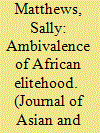

|
|
|
|
|
| Publication |
2010.
|
| Summary/Abstract |
Recent discussions in South Africa about the role of the so-called patriotic bourgeoisie highlight the much debated question of what role elite Africans can and ought to play in the upliftment of the poor. Those supporting the notion of a patriotic bourgeoisie believe that national or racial solidarity is sufficient to allow privileged Africans to act in the interests of their poorer fellow citizens. However, a reconsideration of an older discussion of African elitehood, that of Amilcar Cabral, suggests that something more may be needed before elites can act in the interests of the poor. Cabral argues that elites need to renounce their privilege and to live and struggle alongside the poor if pro-poor societal transformation is to be achieved. While Cabral may be right that shared racial or national identity is insufficient for elite solidarity with the poor, he does not consider all the complexities that arise when elites actually try to work with and for the poor. A consideration of the experiences of a long-standing Senegalese NGO reveal some of these complexities and suggest that any attempt by African elites to engage meaningfully in the upliftment of the poor, will inevitably involve continuous and difficult negotiation between paternalism and naïve egalitarianism.
|
|
|
|
|
|
|
|
|
|
|
|
|
|
|
|
| 2 |
ID:
113098
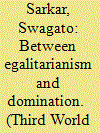

|
|
|
|
|
| Publication |
2012.
|
| Summary/Abstract |
This article presents the problem of governing differences as a problem of constituting a social whole out of the play of antagonistic elements like class, caste, gender, religion, etc, which is essentially a modernist political project in its normative grounding. The problem is explored here vis-à-vis the trajectories of global capitalism and the options for development (that is, the transition from an agrarian economy to an industrial one) for the smaller federal states. The experience of the Left Front Government in West Bengal, India is analysed to understand the issues at stake. The narrative presented in the article shows that questions of land ownership and freedom from oppression and bodily toil remain the fundamental political problem which determines the course and dynamics of governance of differences, particularly its egalitarian mode. This problemat also points towards the limits of agrarian modernity, which many post-colonial countries have tried to constitute.
|
|
|
|
|
|
|
|
|
|
|
|
|
|
|
|
| 3 |
ID:
100273
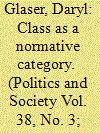

|
|
|
|
|
| Publication |
2010.
|
| Summary/Abstract |
Race and sex/gender are commonly argued to deserve equal priority with class oppression in egalitarian politics. However, placing race and sex in the same list as what is here termed "standard-of-living class" constitutes a category error. Standard of living, alongside power and status, belongs to a distinctive list of "metrics of hierarchy" that should be accorded priority in an important respect: in the specification of the hierarchies (or "distribution strata") that egalitarians seek ultimately to eliminate or reduce. Race and sex, along with other "differentiators," matter primarily for the way they are "used" by social arrangements (e.g., apartheid, patriarchy, capitalism) to assign persons to places in hierarchies of living standard, power, and status. Examining policies to promote black capitalism in post-apartheid South Africa, the author shows how the conflation of differentiators (race, in this case) and distribution strata (like standard-of-living class) is complicit in justifying multiracialized inequality.
|
|
|
|
|
|
|
|
|
|
|
|
|
|
|
|
| 4 |
ID:
086015
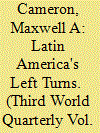

|
|
|
|
|
| Publication |
2009.
|
| Summary/Abstract |
In rapid succession leftwing parties have been elected to government in some of the most important countries in the Latin American region. I challenge the view that there are two distinct variants of the left-one populist, the other social democratic-and argue that variation on the left reflects the diverse conditions under which these forces emerge and evolve. I outline common features shared by the left in Latin America; suggest how the concept of populism and analysis of social movements can help explain this variation; and show how the left's commitment to egalitarianism, balancing markets, and, in some cases, its appeals to the constituent power of the people enabled it to benefit from disillusionment with the results of neoliberalism, the poor performance of democratic governments in Latin America, and the evolving international context.
|
|
|
|
|
|
|
|
|
|
|
|
|
|
|
|
| 5 |
ID:
153294
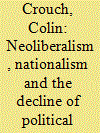

|
|
|
|
|
| Summary/Abstract |
The three great Western political traditions (conservatism, liberalism, social democracy) incorporate three of the four possible combinations of the core political axes: traditional, unchanging authority versus the challenge of change, and egalitarianism versus inegalitarianism. The fourth possibility—egalitarian conservatism—has appeared in various guises, but has usually become submerged within the right, including its most authoritarian forms. Current xenophobic movements claiming to represent those suffering from excessive change—for example, those involved in the UK's EU referendum and Donald Trump's victory in the USA—are seeing an apparent resurgence of this neglected tradition. What are its implications for politics in general?
|
|
|
|
|
|
|
|
|
|
|
|
|
|
|
|
| 6 |
ID:
096276
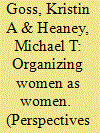

|
|
|
|
|
| Publication |
2010.
|
| Summary/Abstract |
The Million Mom March (favoring gun control) and Code Pink: Women for Peace (focusing on foreign policy, especially the war in Iraq) are organizations that have mobilized women as women in an era when other women's groups struggled to maintain critical mass and turned away from non-gender-specific public issues. This article addresses how these organizations fostered collective consciousness among women, a large and diverse group, while confronting the echoes of backlash against previous mobilization efforts by women. We argue that the March and Code Pink achieved mobilization success by creating hybrid organizations that blended elements of three major collective action frames: maternalism, egalitarianism, and feminine expression. These innovative organizations invented hybrid forms that cut across movements, constituencies, and political institutions. Using surveys, interviews, and content analysis of organizational documents, this article explains how the March and Code Pink met the contemporary challenges facing women's collective action in similar yet distinct ways. It highlights the role of feminine expression and concerns about the intersectional marginalization of women in resolving the historic tensions between maternalism and egalitarianism. It demonstrates hybridity as a useful analytical lens to understand gendered organizing and other forms of grassroots collective action.
|
|
|
|
|
|
|
|
|
|
|
|
|
|
|
|
| 7 |
ID:
155422
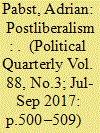

|
|
|
|
|
| Summary/Abstract |
Brexit and support for anti-establishment insurgencies suggest that British politics is moving away from the old left–right opposition towards a new divide between the defenders and detractors of progressive liberalism. As this article suggests, progressive liberalism differs significantly from both classical and new liberalism. It fuses free-market economics with social egalitarianism and identity politics. Both the hard left and the radical right reject this combination and want to undo a number of liberal achievements.
|
|
|
|
|
|
|
|
|
|
|
|
|
|
|
|
|
|
|
|
|